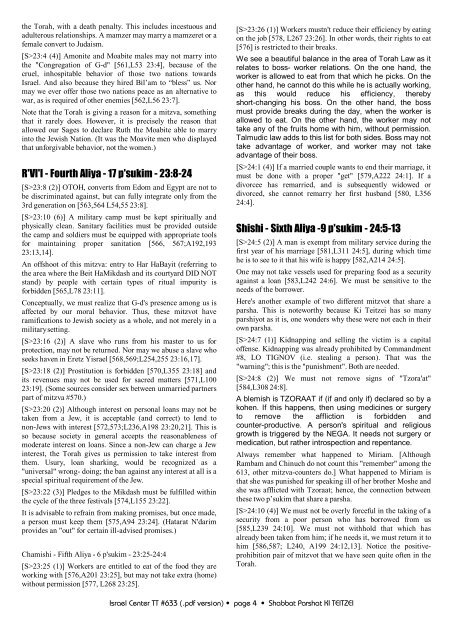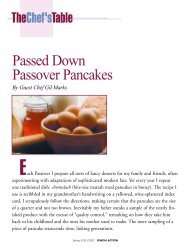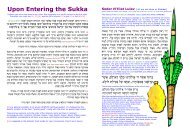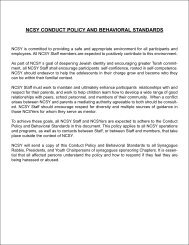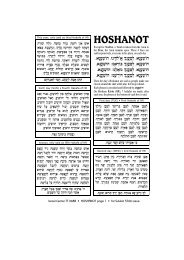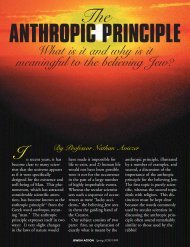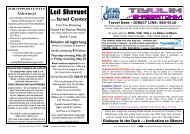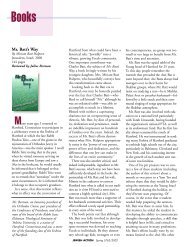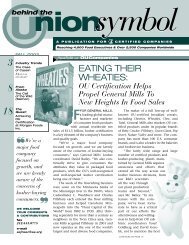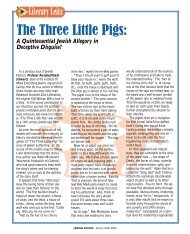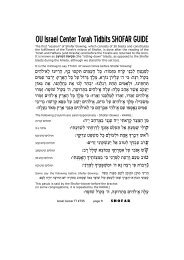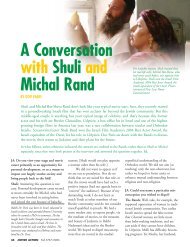You also want an ePaper? Increase the reach of your titles
YUMPU automatically turns print PDFs into web optimized ePapers that Google loves.
the Torah, with a death penalty. This includes incestuous and<br />
adulterous relationships. A mamzer may marry a mamzeret or a<br />
female convert to Judaism.<br />
[S>23:4 (4)] Amonite and Moabite males may not marry into<br />
the "Congregation of Gd" [561,L53 23:4], because of the<br />
cruel, inhospitable behavior of those two nations towards<br />
Israel. And also because they hired Bil’am to “bless”us. Nor<br />
may we ever offer those two nations peace as an alternative to<br />
war, as is required of other enemies [562,L56 23:7].<br />
Note that the Torah is giving a reason for a mitzva, something<br />
that it rarely does. However, it is precisely the reason that<br />
allowed our Sages to declare Ruth the Moabite able to marry<br />
into the Jewish Nation. (It was the Moavite men who displayed<br />
that unforgivable behavior, not the women.)<br />
R'VI'I Fourth Aliya 17 p'sukim 23:824<br />
[S>23:8 (2)] OTOH, converts from Edom and Egypt are not to<br />
be discriminated against, but can fully integrate only from the<br />
3rd generation on [563,564 L54,55 23:8].<br />
[S>23:10 (6)] A military camp must be kept spiritually and<br />
physically clean. Sanitary facilities must be provided outside<br />
the camp and soldiers must be equipped with appropriate tools<br />
for maintaining proper sanitation [566, 567;A192,193<br />
23:13,14].<br />
An offshoot of this mitzva: entry to Har HaBayit (referring to<br />
the area where the Beit HaMikdash and its courtyard DID NOT<br />
stand) by people with certain types of ritual impurity is<br />
forbidden [565,L78 23:11].<br />
Conceptually, we must realize that Gd's presence among us is<br />
affected by our moral behavior. Thus, these mitzvot have<br />
ramifications to Jewish society as a whole, and not merely in a<br />
military setting.<br />
[S>23:16 (2)] A slave who runs from his master to us for<br />
protection, may not be returned. Nor may we abuse a slave who<br />
seeks haven in Eretz Yisrael [568,569;L254,255 23:16,17].<br />
[S>23:18 (2)] Prostitution is forbidden [570,L355 23:18] and<br />
its revenues may not be used for sacred matters [571,L100<br />
23:19]. (Some sources consider sex between unmarried partners<br />
part of mitzva #570.)<br />
[S>23:20 (2)] Although interest on personal loans may not be<br />
taken from a Jew, it is acceptable (and correct) to lend to<br />
nonJews with interest [572,573;L236,A198 23:20,21]. This is<br />
so because society in general accepts the reasonableness of<br />
moderate interest on loans. Since a nonJew can charge a Jew<br />
interest, the Torah gives us permission to take interest from<br />
them. Usury, loan sharking, would be recognized as a<br />
"universal" wrong doing; the ban against any interest at all is a<br />
special spiritual requirement of the Jew.<br />
[S>23:22 (3)] Pledges to the Mikdash must be fulfilled within<br />
the cycle of the three festivals [574,L155 23:22].<br />
It is advisable to refrain from making promises, but once made,<br />
a person must keep them [575,A94 23:24]. (Hatarat N'darim<br />
provides an "out" for certain illadvised promises.)<br />
Chamishi Fifth Aliya 6 p'sukim 23:2524:4<br />
[S>23:25 (1)] Workers are entitled to eat of the food they are<br />
working with [576,A201 23:25], but may not take extra (home)<br />
without permission [577, L268 23:25].<br />
[S>23:26 (1)] Workers mustn't reduce their efficiency by eating<br />
on the job [578, L267 23:26]. In other words, their rights to eat<br />
[576] is restricted to their breaks.<br />
We see a beautiful balance in the area of Torah Law as it<br />
relates to boss worker relations. On the one hand, the<br />
worker is allowed to eat from that which he picks. On the<br />
other hand, he cannot do this while he is actually working,<br />
as this would reduce his efficiency, thereby<br />
shortchanging his boss. On the other hand, the boss<br />
must provide breaks during the day, when the worker is<br />
allowed to eat. On the other hand, the worker may not<br />
take any of the fruits home with him, without permission.<br />
Talmudic law adds to this list for both sides. Boss may not<br />
take advantage of worker, and worker may not take<br />
advantage of their boss.<br />
[S>24:1 (4)] If a married couple wants to end their marriage, it<br />
must be done with a proper "get" [579,A222 24:1]. If a<br />
divorcee has remarried, and is subsequently widowed or<br />
divorced, she cannot remarry her first husband [580, L356<br />
24:4].<br />
Shishi Sixth Aliya 9 p'sukim 24:513<br />
[S>24:5 (2)] A man is exempt from military service during the<br />
first year of his marriage [581,L311 24:5], during which time<br />
he is to see to it that his wife is happy [582,A214 24:5].<br />
One may not take vessels used for preparing food as a security<br />
against a loan [583,L242 24:6]. We must be sensitive to the<br />
needs of the borrower.<br />
Here's another example of two different mitzvot that share a<br />
parsha. This is noteworthy because Ki Teitzei has so many<br />
parshiyot as it is, one wonders why these were not each in their<br />
own parsha.<br />
[S>24:7 (1)] Kidnapping and selling the victim is a capital<br />
offense. Kidnapping was already prohibited by Commandment<br />
#8, LO TIGNOV (i.e. stealing a person). That was the<br />
"warning"; this is the "punishment". Both are needed.<br />
[S>24:8 (2)] We must not remove signs of "Tzora'at"<br />
[584,L308 24:8].<br />
A blemish is TZORAAT if (if and only if) declared so by a<br />
kohen. If this happens, then using medicines or surgery<br />
to remove the affliction is forbidden and<br />
counterproductive. A person's spiritual and religious<br />
growth is triggered by the NEGA. It needs not surgery or<br />
medication, but rather introspection and repentance.<br />
Always remember what happened to Miriam. [Although<br />
Rambam and Chinuch do not count this "remember" among the<br />
613, other mitzvacounters do.] What happened to Miriam is<br />
that she was punished for speaking ill of her brother Moshe and<br />
she was afflicted with Tzoraat; hence, the connection between<br />
these two p’sukim that share a parsha.<br />
[S>24:10 (4)] We must not be overly forceful in the taking of a<br />
security from a poor person who has borrowed from us<br />
[585,L239 24:10]. We must not withhold that which has<br />
already been taken from him; if he needs it, we must return it to<br />
him [586,587; L240, A199 24:12,13]. Notice the positiveprohibition<br />
pair of mitzvot that we have seen quite often in the<br />
Torah.<br />
Israel Center TT #633 (.pdf version) · page 4 · Shabbat Parshat KI TEITZEI


